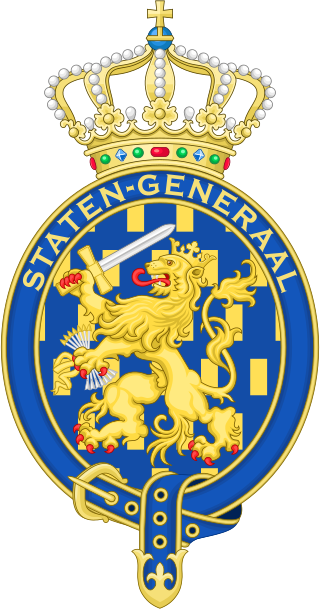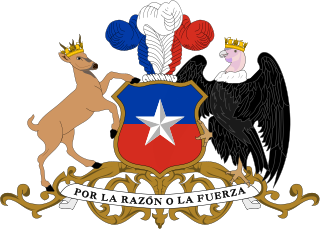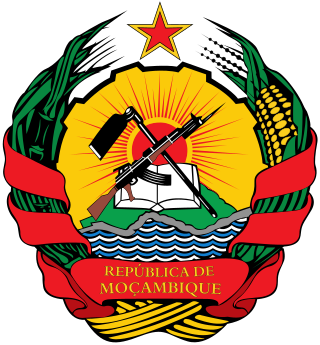Related Research Articles

Dutch nationality law details the conditions by which a person holds Dutch nationality. The primary law governing these requirements is the Dutch Nationality Act, which came into force on 1 January 1985. Regulations apply to the entire Kingdom of the Netherlands, which includes the country of the Netherlands itself, Aruba, Curaçao, and Sint Maarten.

Nationality law of Greece is based on the principle of jus sanguinis. Greek citizenship may be acquired by descent or through naturalization. Greek law permits dual citizenship. A Greek national is a citizen of the European Union, and therefore entitled to the same rights as other EU citizens.

Ukrainian nationality law details the conditions by which a person holds nationality of Ukraine. The primary law governing these requirements is the law "On Citizenship of Ukraine", which came into force on 1 March 2001.

Chilean nationality law is based on both principles of jus soli and jus sanguini. Nationality law is regulated by Article 10 of the Political Constitution of the Republic of Chile. The legal means to acquire nationality, formal membership in a nation, differ from the relationship of rights and obligations between a national and the nation, known as citizenship.

Azerbaijani nationality law is regulated by the Constitution of Azerbaijan, as amended; the Citizenship Law of Azerbaijan and its revisions; and various international agreements to which the country is a signatory. These laws determine who is, or is eligible to be, an Azerbaijani national. The legal means to acquire nationality, formal legal membership in a nation, differ from the domestic relationship of rights and obligations between a national and the nation, known as citizenship. Nationality describes the relationship of an individual to the state under international law, whereas citizenship is the domestic relationship of an individual within the nation. Some countries use the terms nationality and citizenship as synonyms, despite their legal distinction and the fact that they are regulated by different governmental administrative bodies. Colloquially, as in most former Soviet states, citizenship is often used as a synonym for nationality, because nationality is associated with ethnicity. Azerbaijani nationality is typically obtained under the principle of jus sanguinis, i.e. by birth to parents with Azerbaijani nationality. It can be granted to persons with an affiliation to the country, or to a permanent resident who has lived in the country for a given period of time through naturalization.
Indonesian nationality law is regulated by the 1945 Constitution, as amended; various statutes on nationality, as revised over time; as well as international agreements to which Indonesia has been a signatory. These laws determine who is, or is eligible to be, a national of Indonesia. The legal means to acquire nationality and formal membership in a nation differ from the relationship of rights and obligations between a national and the nation, known as citizenship. Indonesian nationality is typically obtained either on the principle of Jus sanguinis, i.e. by birth abroad to at least one parent with Indonesian nationality; or under Restricted Jus soli, i.e. by birth in Indonesia. It can also be granted to a permanent resident who has lived in Indonesia for a given period of time through naturalization, as long as the parents are stateless, or unknown.

Tanzanian nationality law is regulated by the Constitution of Tanzania, as amended; the Tanzania Citizenship Act, and its revisions; and various international agreements to which the country is a signatory. These laws determine who is, or is eligible to be, a national of Tanzania. The legal means to acquire nationality, formal legal membership in a nation, differ from the domestic relationship of rights and obligations between a national and the nation, known as citizenship. Nationality describes the relationship of an individual to the state under international law, whereas citizenship is the domestic relationship of an individual within the nation. Commonwealth countries, including Tanzania, often use the terms nationality and citizenship as synonyms, despite recognising their legal distinction and the fact that they are regulated by different governmental administrative bodies. For much of Tanzania's history racist policy curtailed domestic rights and nationality. Tanzanian nationality is typically obtained under the principle of jus soli, i.e. by birth in the territory, or jus sanguinis, i.e. by birth in Tanzania or abroad to parents with Tanzanian nationality. It can be granted to persons with an affiliation to the country, or to a permanent resident who has lived in the country for a given period of time through naturalisation.

Ghanaian nationality law is regulated by the Constitution of Ghana, as amended; the Ghana Citizenship Act, and its revisions; and various international agreements to which the country is a signatory. These laws determine who is, or is eligible to be, a national of Ghana. The legal means to acquire nationality, formal legal membership in a nation, differ from the domestic relationship of rights and obligations between a national and the nation, known as citizenship. Nationality describes the relationship of an individual to the state under international law, whereas citizenship is the domestic relationship of an individual within the nation. Ghanaian nationality is typically obtained under the principle of jus sanguinis, born to parents with Ghanaian nationality. It can be granted to persons with an affiliation to the country, or to a permanent resident who has lived in the country for a given period of time through naturalization.

Namibian nationality law is regulated by the Constitution of Namibia, as amended; the Namibian Citizenship Act, and its revisions; and various international agreements to which the country is a signatory. These laws determine who is, or is eligible to be, a national of Namibia. The legal means to acquire nationality, formal legal membership in a nation, differ from the domestic relationship of rights and obligations between a national and the nation, known as citizenship. Nationality describes the relationship of an individual to the state under international law, whereas citizenship is the domestic relationship of an individual within the nation.

Burundian nationality law is regulated by the Constitution of Burundi, as amended; the Nationality Code of Burundi, and its revisions; and various international agreements to which the country is a signatory. These laws determine who is, or is eligible to be, a national of Burundi. The legal means to acquire nationality, formal legal membership in a nation, differ from the domestic relationship of rights and obligations between a national and the nation, known as citizenship. Burundian nationality is typically obtained under the principle of jus sanguinis, i.e. by birth in Burundi or abroad to parents with Burundian nationality. It can be granted to persons with an affiliation to the country, or to a permanent resident who has lived in the country for a given period of time through naturalization.

Angolan nationality law is regulated by the Constitution of Angola, as amended; the Nationality Act, and its revisions; and various international agreements to which the country is a signatory. These laws determine who is, or is eligible to be, a national of Angola. The legal means to acquire nationality, formal legal membership in a nation, differ from the domestic relationship of rights and obligations between a national and the nation, known as citizenship. Angolan nationality is typically obtained under the principle of jus sanguinis, i.e. by birth in Angola or abroad to parents with Angolan nationality. It can be granted to persons with an affiliation to the country, or to a permanent resident who has lived in the country for a given period of time through naturalization.

South Sudanese nationality law is regulated by the Constitution of South Sudan, as amended; the South Sudanese Nationality Act and Nationality Regulations, and their revisions; and various international agreements to which the country is a signatory. These laws determine who is, or is eligible to be, a national of South Sudan. The legal means to acquire nationality, formal legal membership in a nation, differ from the domestic relationship of rights and obligations between a national and the nation, known as citizenship. Nationality describes the relationship of an individual to the state under international law, whereas citizenship is the domestic relationship of an individual within the nation. In South Sudan, nationality is often equated with ethnicity, despite recognition of the legal definitions. South Sudanese nationality is typically obtained under the principle of jus soli, i.e. by birth in South Sudan, or jus sanguinis, born to parents with South Sudanese ancestry. It can be granted to persons with an affiliation to the country, or to a permanent resident who has lived in the country for a given period of time through naturalization.
Guatemalan nationality law is regulated by the 1985 Constitution, as amended in 1995, and the 1966 Nationality Law, as amended in 1996. These laws determine who is, or is eligible to be, a citizen of Guatemala. The legal means to acquire nationality and formal membership in a nation differ from the relationship of rights and obligations between a national and the nation, known as citizenship. Guatemalan nationality is typically obtained either on the principle of jus soli, i.e. by birth in Guatemala; or under the rules of jus sanguinis, i.e. by birth abroad to at least one parent with Guatemalan nationality. It can also be granted to a permanent resident who has lived in Guatemala for a given period of time through naturalization.
Costa Rican nationality law is regulated by the Options and Naturalizations Act, which was originally named the Immigration and Naturalization Act and established under the 1949 Constitution. These laws determine who is, or is eligible to be, a citizen of Costa Rica. The legal means to acquire nationality and formal membership in a nation differ from the relationship of rights and obligations between a national and the nation, known as citizenship. Costa Rican nationality is typically obtained either on the principle of jus soli, i.e. by birth in Costa Rica; or under the rules of jus sanguinis, i.e. by birth abroad to at least one parent with Costa Rican nationality. It can also be granted to a permanent resident who has lived in Costa Rica for a given period of time through naturalization.
East Timorese nationality law is regulated by the 2002 Constitution, the Nationality Act of the same year, the regulation of the Nationality Act Decree-Law No. 1 of 2004, as well as various international agreements to which East Timor has been a signatory. These laws determine who is, or is eligible to be, a national of East Timor. The legal means to acquire nationality and formal membership in a nation differ from the relationship of rights and obligations between a national and the nation, known as citizenship. East Timorese nationality is typically obtained either on the principle of jus soli, i.e. by birth in East Timor; or under the rules of jus sanguinis, i.e. by birth abroad to at least one parent with East Timorese nationality. It can also be granted to a permanent resident who has lived in East Timor for a given period of time through naturalization.

Cape Verdean nationality law is regulated by the Constitution of Cape Verde, as amended; the Nationality Act, and its revisions; and various international agreements to which the country is a signatory. These laws determine who is, or is eligible to be, a national of Cape Verde. The legal means to acquire nationality, formal legal membership in a nation, differ from the domestic relationship of rights and obligations between a national and the nation, known as citizenship. Cape Verdean nationality is typically obtained under the principle of jus sanguinis, i.e. by birth in Cape Verde or abroad to parents with Cape Verdean nationality. It can be granted to persons with an affiliation to the country, or to a permanent resident who has lived in the country for a given period of time through naturalization.

Gambian nationality law is regulated by the Constitution of The Gambia, as amended; The Gambia Nationality and Citizenship Act, and its revisions; and various international agreements to which the country is a signatory. These laws determine who is, or is eligible to be, a national of The Gambia. The legal means to acquire nationality, formal legal membership in a nation, differ from the domestic relationship of rights and obligations between a national and the nation, known as citizenship. Nationality describes the relationship of an individual to the state under international law, whereas citizenship is the domestic relationship of an individual within the nation. Gambian nationality is typically obtained under the principle of jus sanguinis, born to parents with Gambian nationality. It can be granted to persons with an affiliation to the country, or to a permanent resident who has lived in the country for a given period of time through naturalisation.

Mozambican nationality law is regulated by the Constitution of Mozambique, as amended; the Nationality Law and Nationality Regulation, and their revisions; and various international agreements to which the country is a signatory. These laws determine who is, or is eligible to be, a national of Mozambique. The legal means to acquire nationality, formal legal membership in a nation, differ from the domestic relationship of rights and obligations between a national and the nation, known as citizenship. Nationality describes the relationship of an individual to the state under international law, whereas citizenship is the domestic relationship of an individual within the nation. Mozambican nationality is typically obtained under the principle of jus soli, i.e. by birth in the territory, or jus sanguinis, i.e. by birth in Mozambique or abroad to parents with Mozambican nationality. It can be granted to persons with an affiliation to the country, or to a permanent resident who has lived in the country for a given period of time through naturalization.

Rwandan nationality law is regulated by the Constitution of Rwanda, as amended; the Nationality Code of Rwanda, and its revisions; the Law of Persons and Family; and various international agreements to which the country is a signatory. These laws determine who is, or is eligible to be, a national of Rwanda. The legal means to acquire nationality, formal legal membership in a nation, differ from the domestic relationship of rights and obligations between a national and the nation, known as citizenship.

São Toméan nationality law is regulated by the Constitution of São Tomé and Príncipe, as amended; the Nationality Law, and its revisions; and various international agreements to which the country is a signatory. These laws determine who is, or is eligible to be, a national of São Tomé and Príncipe. The legal means to acquire nationality, formal legal membership in a nation, differ from the domestic relationship of rights and obligations between a national and the nation, known as citizenship. Nationality describes the relationship of an individual to the state under international law, whereas citizenship is the domestic relationship of an individual within the nation. São Toméan nationality is typically obtained under the principles of jus soli, i.e. by birth in the territory, or jus sanguinis, i.e. by birth in São Tomé and Príncipe or abroad to parents with São Toméan nationality. It can be granted to persons with an affiliation to the country, or to a permanent resident who has lived in the country for a given period of time through naturalization.
References
Citations
- ↑ Ahmadali & Luk 2015, pp. 1, 3.
- ↑ Boll 2007, p. 66-67.
- ↑ Honohan & Rougier 2018, p. 338.
- ↑ Guerry & Rundell 2016, p. 73.
- 1 2 3 4 5 Ahmadali & Luk 2015, p. 2.
- ↑ Ahmadali & Luk 2015, pp. 7–8.
- 1 2 Ahmadali & Luk 2015, p. 4.
- 1 2 3 4 Ahmadali & Luk 2015, p. 6.
- ↑ Ahmadali & Luk 2015, pp. 10–11.
- ↑ Ahmadali & Luk 2015, pp. 4–5.
- 1 2 Ahmadali & Luk 2015, p. 5.
- ↑ Ministry of Justice 2011.
- 1 2 3 4 Ahmadali & Luk 2015, p. 7.
- ↑ Heemskerk & Duijves 2014, p. 42.
- ↑ Heemskerk & Duijves 2014, p. 56.
- 1 2 3 4 5 6 7 8 Ahmadali & Luk 2015, p. 8.
- ↑ Ahmadali & Luk 2015, p. 9.
- ↑ Heemskerk & Duijves 2014, pp. 14–15.
- ↑ Ahmadali & Luk 2015, p. 10.
- 1 2 3 4 Ahmadali & Luk 2015, p. 11.
- 1 2 Ahmadali & Luk 2015, p. 12.
- ↑ Ahmadali & Luk 2015, p. 20-21.
- ↑ Heemskerk & Duijves 2014, p. 121.
- ↑ Sluiter 1933, pp. 2–3.
- ↑ Braveboy-Wagner & Griffin 2017, p. 143.
- ↑ Prothero 1920, p. 10.
- ↑ Prothero 1920, p. 17.
- ↑ Kloek & Mijnhardt 2004, pp. 133–134.
- ↑ Hartkamp 1975, p. 1059.
- ↑ Kloek & Mijnhardt 2004, p. 222.
- ↑ Donner 1994, p. 207.
- 1 2 van Oers, de Hart & Groenendijk 2010, p. 2.
- ↑ Gowricharn 2020.
- ↑ van Oers, de Hart & Groenendijk 2010, pp. 2, 8.
- ↑ Söhngen 1930, p. 9.
- ↑ van Oers, de Hart & Groenendijk 2010, p. 8.
- ↑ Söhngen 1930, p. 12.
- ↑ van Oers, de Hart & Groenendijk 2010, p. 5.
- ↑ van Oers, de Hart & Groenendijk 2010, pp. 8–9.
- ↑ Donner 1994, p. 282.
- ↑ Donner 1994, pp. 282–283.
- ↑ van den Bosch 2013, p. 2.
- ↑ van den Bosch 2013, p. 3.
- ↑ van den Bosch 2013, p. 4.
- 1 2 Ahmadali & Luk 2015, p. 3.
- ↑ Star Nieuws 2014.
- ↑ Theodorou 2014.
Bibliography
- Ahmadali, Hamied; Luk, Ngo Chun (September 2015). "Report on Citizenship Law: Suriname" (PDF). cadmus.eui.eu. Badia Fiesolana: European University Institute. Archived (PDF) from the original on 9 December 2018. Retrieved 5 February 2021.
- Boll, Alfred Michael (2007). Multiple Nationality And International Law. Leiden: Martinus Nijhoff Publishers. ISBN 978-90-04-14838-3.
- Braveboy-Wagner, Jacqueline; Griffin, Clifford (2017). Historical Dictionary of United States-Caribbean Relations. Lanham, Maryland: Rowman & Littlefield. ISBN 978-1-5381-0223-7.
- Donner, Ruth (1994). The Regulation of Nationality in International Law (2nd ed.). Irvington-on-Hudson, New York: Transnational Publishers. ISBN 978-0-941320-77-1.
- Gowricharn, Ruben (2020). "Suriname's Constitutional Limits". In Albert, Richard; O'Brien, Derek; Wheatle, Se-shauna (eds.). The Oxford Handbook of Caribbean Constitutions. Oxford: Oxford University Press. ISBN 978-0-19-879304-5.
- Guerry, Linda; Rundell, Ethan (2016). "Married Women's Nationality in the International Context (1918–1935)". Clio. Paris: Éditions Belin. 43 (1: Gender and the Citizen): 73–94. ISSN 2554-3822. JSTOR 26242543. OCLC 7788119453 . Retrieved December 19, 2020.
- Hartkamp, Arthur S. (September 1975). "Civil Code Revision in the Netherlands: A Survey of Its System and Contents, and Its Influence on Dutch Legal Practice" (PDF). Louisiana Law Review . Baton Rouge, Louisiana: Louisiana State University. 35 (5): 1059–1090. ISSN 0024-6859. OCLC 8092736363. Archived from the original (PDF) on 5 February 2021. Retrieved 5 February 2021.
- Heemskerk, Marieke; Duijves, Celine (October 2014). "Suriname Migration Profile: A Study on Emigration from, and Immigration into Suriname" (PDF). Georgetown, Guyana: International Organization for Migration. Archived (PDF) from the original on 26 February 2021. Retrieved 26 February 2021.
- Honohan, Iseult; Rougier, Nathalie (October 2018). "Global Birthright Citizenship Laws: How Inclusive?". Netherlands International Law Review. The Hague, Netherlands: Springer Science+Business Media, T.M.C. Asser Press. 65 (3): 337–357. doi:10.1007/s40802-018-0115-8. ISSN 1741-6191. OCLC 1189243655. S2CID 149761560 . Retrieved 16 March 2021.
- Kloek, Joost; Mijnhardt, Wijnand (2004). Dutch Culture in a European Perspective: 1800, Blueprints for a National Community. Translated by Jackson, Beverly. London: Uitgeverij Van Gorcum / Palgrave Macmillan. ISBN 978-90-232-3964-2.
- Prothero, G. W. (1920). Dutch Guiana (PDF). London: H.M. Stationery Office. OCLC 254585628.
- Sluiter, Engel (February 1933). "Dutch Guiana: A Problem in Boundaries". The Hispanic American Historical Review . Durham, North Carolina: Duke University Press. 13 (1): 2–22. doi:10.2307/2506542. ISSN 0018-2168. JSTOR 2506542. OCLC 7792531767 . Retrieved 22 January 2021.
- Söhngen, Frederika Adolphina (1930). De nationaliteit van de gehuwde vrouw [The Nationality of the Married Woman] (in Dutch). Amsterdam: H. J. Paris. OCLC 1024185871.
- Theodorou, Angelina E. (5 August 2014). "27 Countries Limit a Woman's Ability to Pass Citizenship to Her Child or Spouse". Pew Research. Washington, D.C.: Pew Research Center. Archived from the original on 3 December 2020. Retrieved 20 April 2021.
- van den Bosch, D.P. (September 2013). "Toescheiding van nationaliteit" [Attribution of Nationality](PDF). rechtenoverheid.nl (in Dutch). The Hague: Academie voor Overheidsjuristen. Archived (PDF) from the original on 18 May 2019. Retrieved 6 February 2021.
- van Oers, Ricky; de Hart, Betty; Groenendijk, Kees (April 2010). "Country Report: The Netherlands" (PDF). cadmus.eui.eu (revised ed.). Badia Fiesolana: European University Institute. Archived from the original on 2 November 2018. Retrieved 5 February 2021.
- "Aanpassing Wet Surinaamse nationaliteit aangenomen" [Surinamese Nationality Act Adopted]. Star Nieuws (in Dutch). Paramaribo, Suriname. 11 July 2014. Archived from the original on 13 July 2014. Retrieved 6 February 2021.
- "Nieuw Burgerlijk Wetboek van Suriname" [New Civil Code of Suriname](PDF). Government of Suriname (in Dutch). Paramaribo: Ministerie van Justitie en Politie. 6 May 2011. Archived from the original on 25 October 2017. Retrieved 26 February 2021.